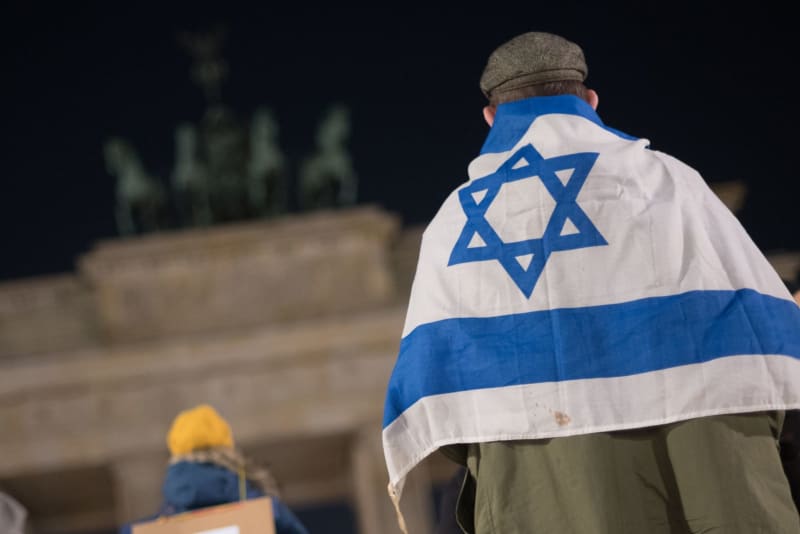On the first anniversary of the unprecedented terrorist attacks carried out by the Palestinian militant group Hamas on October 7, 2023, memorials and vigils were held across Germany. In Berlin, the Brandenburg Gate was illuminated with the Israeli flag, symbolizing solidarity with the victims. Activists gathered earlier in the day to read out the names of the 1,170 individuals who lost their lives and the 255 who were abducted during these attacks. During these somber events, German President Frank-Walter Steinmeier emphasized the significance of the motto “Never again,” a phrase reminiscent of Germany’s commitment to remembering the Holocaust, where six million Jews were murdered under the Nazi regime. In the aftermath of Hamas’ assault, seen as the most grievous attack against Jews since World War II, Germany reinforced its stance as a close ally of Israel, continuing the historic ties forged due to the nation’s responsibility for past atrocities.
Currently, approximately 100 hostages taken during the October 7 attacks remain believed to be in captivity in Gaza, with their fates uncertain. The subsequent Israeli military operations aimed at Gaza have resulted in a devastating loss of Palestinian life, estimated to be tens of thousands, drawing international criticism and concerns over a broader regional escalation. German leaders have also noticed this rising tension, as recent military offensives by Israel extend into Lebanon and involve missile exchanges with Iran. Steinmeier plans to address the intensity of the conflict, confronting both the losses suffered and the ethical implications of military actions taken in the name of defense. He emphasized that while Israel has the right to defend itself, there must be discussions about where the limits of such self-defense lie.
At the upcoming interfaith memorial service in Berlin, Steinmeier is expected to reflect on the overwhelming pain that the current war has inflicted on all involved—Israeli civilians, Palestinians, and the people of Lebanon. He has publicly stated that there has already been immense suffering resulting from the conflict, and he intends to counsel against oversimplified solutions that fail to recognize the multifaceted nature of the crisis. Moreover, Steinmeier articulated his abhorrence for the rising anti-Semitism within Germany and the resulting anxiety felt by Jewish communities. He denounced any calls for a future in the Middle East without Israel, associating such sentiments with hatred toward Jewish people, emphasizing the importance of maintaining moral clarity amid international tribulation.
In conjunction with the memorials, Germany also witnessed several pro-Palestinian demonstrations in various cities, including one in Frankfurt that was permitted after a local court overturned a ban. A notable protest in Berlin saw clashes between demonstrators and police, one that echoed sentiments of solidarity with Palestine, albeit phrases that some European authorities categorize as advocating erasure of Israel. With more than 2,000 police officers deployed in Berlin to maintain order, several arrests were made after protestors engaged in confrontational behavior. The events reflect the heated and polarized nature of the discussion surrounding the ongoing conflict, especially within Germany’s diverse communities that harbor conflicting views regarding solidarity with Israel and awareness of Palestinian suffering.
The reactions within Germany following the events of October 7 have proven sensitive. The nation views Israel’s security as a primary national concern, rooted deeply in its historical guilt stemming from the Holocaust. Yet significant disparities and feelings of alienation persist among Germany’s Muslim communities and pro-Palestinian groups, who feel their perspectives on the suffering in Gaza are oftentimes overlooked by the government. While Chancellor Olaf Scholz reaffirmed his country’s support for Israel in Hamburg, he simultaneously acknowledged the humanitarian crisis facing Palestinians in Gaza. His call for a ceasefire and commitment to a political resolution indicates an attempt to adopt a balanced approach amid a highly polarizing situation while reaffirming the necessity of addressing the plight of both Israelis and Palestinians.
Ultimately, for the German government, the resolution of this enduring conflict is envisioned through the framework of a two-state solution, which aims to establish independent Israeli and Palestinian states coexisting peacefully side by side. As Germany commemorates the tragic events of October 7, it becomes evident that there is a critical need for inclusive dialogue, understanding, and a commitment to peace that encompasses the aspirations of both peoples. For citizens and leaders alike, the pursuit of such a solution will require recognition of and respect for the historical narratives that shape the legacies of both the Israeli and Palestinian peoples, with a focus on fostering a future where both communities can thrive in safety and dignity. The continuing tensions not only test the bonds of solidarity but also challenge individuals and nations to respond in ways that uphold human rights, dignity, and peace for all involved.

